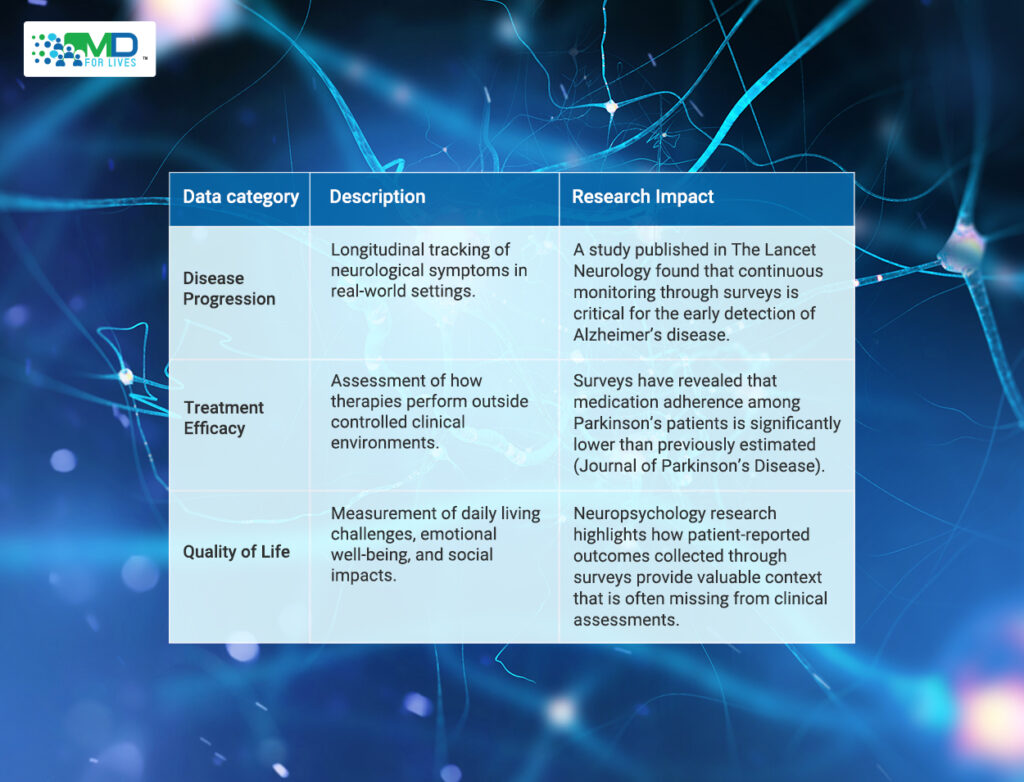Brain disorders affect over 3 billion people globally, placing neurology research as one of the prime priorities in healthcare. However, are the treatments and research truly sufficient to meet the growing demand for better care? ,While imaging technologies and data analytics have enhanced our understanding of conditions like Alzheimer’s, Parkinson’s, and Epilepsy, the development of real-world treatments still lags. So, what’s the missing element? Well, it’s none other than the clinical insights of neurologists, which unfortunately remain largely underutilized.
Neurologists observe how treatments work across diverse patient populations and recognize patterns. Yet, these insights rarely find their way into structured research. This is where survey platforms like MDForLives add value. Our platform offers neurologists a simple, time-efficient way to contribute their expertise through online medical surveys.
Wondering, what makes this approach so effective? Well, neurologists can participate whenever convenient – between appointments, after work hours, or during a coffee break. This ultimately delivers rich, diverse clinical data to researchers developing the next generation of treatments for neurological conditions.
The Challenges Slowing Progress in Neurology Research
Let’s take a look at the challenges that are holding back progress in neurology studies, which are further delaying treatments and impacting millions who are waiting for better care options.
1. Complex disorders and data collection hurdles
Neurological conditions like Alzheimer’s present extraordinary challenges. With 14 million Americans projected to have Alzheimer’s by 2060, researchers still grapple with its causes and diverse symptoms.

Clinical trials in neurology require significant time investments. The Alzheimer’s Disease Neuroimaging Initiative (ADNI), despite its value, faced lengthy delays due to recruitment difficulties and neurodegeneration’s slow progression. These timeline extensions postpone breakthroughs that patients urgently need.
Meanwhile, traditional data collection methods such as traditional surveys, limited interviews, restricted clinic sampling, create information bottlenecks that further impact the effectiveness of treatments.
2. Diversity gaps and recruitment obstacles
A report by The Lancet exposes a troubling reality: neurological trials draw participants primarily from Western, industrialized societies, creating treatments that may fail for patients with different genetic backgrounds.
Why such limited diversity? Recruitment challenges plague neurological studies. Moreover, specialized care requirements and the slow progression of conditions like Parkinson’s lead to high dropout rates before studies conclude.
This leads to serious gaps in collecting the right data – something that surveys are solving!
3. Current solutions aren’t sufficient
Researchers have adopted various technologies to overcome neurological research challenges, but each reveals significant limitations. Wearable devices, though promising 24/7 monitoring for Epilepsy patients, struggle with adoption rates and data integration issues.
Despite these technological advances, neurological research still lacks what it needs the most: diverse, large-scale clinical data collection from real-world settings. Well, this critical gap is precisely where specialized survey platforms like MDForLives deliver exceptional value.
4 Benefits of Using Online Surveys for Neurological Studies
Neurologists face overwhelming schedules, often working 55-60 hours weekly with patient appointments booked months in advance. Between consultations, paperwork, and staying updated with research, finding time for traditional study participation becomes nearly impossible!
This time crunch creates a paradox: the specialists with the most valuable insights have the least availability to share them. So, how can neurologists actually contribute their expertise without sacrificing patient care? This is where online medical surveys make all the difference!
1. Accessibility and Scalability
Neurological research has long faced geographic barriers, but online platforms shatter these limitations. One survey instantly connects specialists across continents – no flights booked, no schedules disrupted. For researchers studying rare conditions, this global reach transforms possibilities overnight.
Wondering what impact it could lead to if insights could be gathered from experts around the world in just a few days?
Well, the approach can scale seamlessly – from targeting 20 Epilepsy experts to gathering hundreds of perspectives. What once required months of coordination now launches in days, with insights flowing simultaneously from specialists worldwide.
2. Accuracy and quick results
Remember those traditional hardcopies of questionnaires that took forever to collect and analyze? Digital methods eliminate these headaches by providing clean data that’s ready to use right away.
Think about the time saved! Instead of waiting weeks or months to gather enough responses, researchers now connect with dozens of neurologists in just days! Plus, digital formats ensure everyone answers the exact same questions under the same conditions. That kind of speed and accuracy can completely transform how quickly we advance neurological treatments.
3. Cost-effectiveness
Traditional research incurs numerous expenses beyond the obvious ones. Administrative time, travel costs, and clinic space utilization all drain budgets. Online medical surveys offer the perfect solution to this issue!
Even after including fair compensation for neurologists, the total cost runs lower than traditional methods while enabling larger sample sizes that improve the studies overall.
4. Better neurologist engagement
Rigid and hectic schedules often block neurologists from participating in research. Survey platforms solve this by adapting to the specialist’s schedule rather than disrupting it.
This flexibility helps in receiving a better response rate to surveys. Neurologists can respond during breaks, while commuting, or after hours from home. While fair compensation (typically between $50–$200 per survey) acknowledges their expertise and effort, there’s another reason that plays a part. Many specialists report that beyond payment, the ability to influence research direction provides significant professional satisfaction.
Types of Valuable Data Collected Through Neuro Surveys
Research platforms capture several distinct categories of neurological data that complement traditional research methods. Each data type offers unique value for advancing neurological care.

The Trust Factor: How Survey Platforms Maintain Rigorous Standards
While online surveys offer valuable benefits for neurological research, physicians should remain mindful of valid concerns around data security.
Modern survey platforms have developed effective solutions to these common concerns:
- Specialist verification ensures credibility: Platforms like MDForLives verify medical credentials before participation, ensuring insights come from qualified neurologists with relevant expertise.
- Thoughtful survey design minimizes bias: Expert-reviewed questions with clear, precise language reduce misinterpretation and response bias that might otherwise compromise findings in neurological studies.
- Strategic sampling improves representation: Careful selection of specialists across different practice settings, geographic regions, and experience levels creates more balanced and applicable insights.
- Built-in validation maintains consistency: Automated checks identify contradictory or problematic responses, allowing researchers to focus on high-quality data.
- Transparent methodology supports scientific standards: Clear documentation of survey parameters and participant demographics allows for appropriate interpretation of findings.
- Anonymized data collection protects privacy: Separation of identifying information from responses allows neurologists to share insights candidly without confidentiality concerns.
- Secure data handling ensures compliance: Implementation of healthcare privacy regulations protects both participants and patients referenced in clinical observations.
By addressing these fundamental concerns, modern survey platforms create a research environment where neurologists can confidently contribute their expertise while maintaining professional standards and scientific integrity.
How Do Online Medical Survey Platforms Work
In an era where healthcare research demands precision and efficiency, online survey platforms have emerged as innovators for data collection. Healthcare organizations are increasingly turning to these survey platforms to overcome traditional research limitations. This is addressing critical challenges like poor patient follow-up, limited trial diversity, and underreported symptoms.
Specialized survey platforms like MDForLives offer a streamlined approach to data collection for neurology, transforming how neurological research gathers insights.
Let’s see how MDForLives does that!
- The process begins with screening participants and verifying their medical credentials to ensure the highest standards of data reliability and professional expertise.
- Each questionnaire is meticulously crafted to align perfectly with specific research objectives, capturing insights with laser-focused accuracy and relevance.
- These surveys are shared securely through the personalized dashboard and via emails with eligible respondents.
- All responses are collected, stored, and managed in strict compliance with international privacy regulations like CCPA & GDPR.
- To ensure fair compensation for their valuable time and contributions, participants are rewarded with gift cards from reputable brands.
- Finally, cutting-edge analytical tools and algorithms convert raw survey data into meaningful, actionable research insights for breakthrough discoveries in neurology.
Shape the Future of Neurology with Every Survey You Complete
As a neurologist, your day-to-day experiences are invaluable in shaping the future of neurological care. Registering with online medical survey platforms allow you to directly influence research by offering insights that reflect patient needs, improving the design and effectiveness of neurological treatments.

With over 7 years of experience, MDForLives supports advanced medical research through a global panel of 900,000+ verified healthcare professionals. We are GDPR and CCPA certified, ensuring data privacy and compliance at every step.
By joining MDForLives, you can help shape the future of neurological treatment, all while fitting it seamlessly into your schedule. Contribute today to drive meaningful change and ensure that tomorrow’s breakthroughs reflect your expertise and experience in the field.
Register Now to participate in Paid Neurology Survey
FAQs:
-
Why is data collection for neurology important?
Gathering data from multiple sources, such as patient records, imaging scans, and behavior assessments, helps break down subtle patterns and biomarkers within neurological diseases.
Through careful analysis of this information, neurologists gain insights into disease progression, early warning signs, and other critical findings. This knowledge supports early intervention, targeted treatment plans, and improved patient outcomes.
-
How do online medical survey platforms ensure data accuracy?
Some of the best survey platforms, like MDForLives, have strict measures in place to deliver accurate and relevant data to healthcare companies. They screen for experienced professionals, verifying their credentials, and matching surveys with practitioners whose expertise aligns with the research goals.
-
What types of neurological data can be collected through surveys?
Platforms compiling data for different aspects of neurological disorders help gain clarity over disease progression. These include patient symptoms, cognitive assessments, treatment responses, medication side effects, family history details, and lifestyle factors that influence neurological conditions.
-
Are online medical survey platforms secure and compliant with regulations?
Healthcare companies must verify if survey platforms are truly secure and compliant, as not all platforms that claim compliance actually meet the required standards. MDForLives stands out as a secure platform with both GDPR and CCPA certification for its physician panel, maintaining the highest standards of data security.
-
How can I participate in neurological research surveys through MDForLives?
MDForLives makes it easy for healthcare professionals to take part in neurological research surveys. Simply fill out an online form sharing your background and experience. After verifying your details, our team helps you build your profile. Once complete, we begin the onboarding process and match you with surveys tailored to your specific expertise.

MDForLives is a global healthcare intelligence platform where real-world perspectives are transformed into validated insights. We bring together diverse healthcare experiences to discover, share, and shape the future of healthcare through data-backed understanding.






